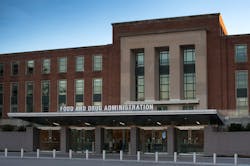FDA issues policy to increase COVID-19 testing capacity
As part of the U.S. Food and Drug Administration’s (FDA) ongoing effort to address the coronavirus outbreak, the agency issued a new policy for certain laboratories seeking to develop diagnostic tests for coronavirus.
The goal of the policy is to achieve more rapid testing capacity in the U.S by allowing certain laboratories to use validated COVID-19 diagnostics before the FDA has completed a review of their Emergency Use Authorization (EUA) requests.
The policy only applies to laboratories that are certified to perform high-complexity testing, consistent with the requirements of the Clinical Laboratory Improvement Amendments.
The new guidance describes the circumstances where the FDA does not intend to object to the use of these tests for clinical testing while the laboratories are pursuing an EUA with the FDA. It also provides recommendations for test developers, including information regarding test validation, FDA notification and interim confirmatory clinical testing.
Following the completion of their test validation, laboratories should communicate with the FDA, via email, to notify the agency that the test has been validated. Laboratories should then submit a completed EUA request within 15 business days of notification, the FDA said in a news release about the new guidance.
The FDA can issue an EUA to permit the use, based on scientific data, of certain medical products that may be effective in diagnosing, treating or preventing a disease or condition because Health and Human Services Secretary Alex Azar determined on February 4 a public health emergency exists. Since then, the FDA has authorized an EUA for a COVID-19 diagnostic test that is in use by the U.S. Centers for Disease Control and Prevention (CDC) and some public health labs across the country.
“We believe this policy strikes the right balance during this public health emergency,” said FDA Commissioner Stephen M. Hahn, MD, “We will continue to help to ensure sound science prior to clinical testing and follow-up with the critical independent review from the FDA, while quickly expanding testing capabilities in the U.S. We are not changing our standards for issuing Emergency Use Authorizations. This action reflects our public health commitment to addressing critical public health needs and rapidly responding and adapting to this dynamic and evolving situation.”
The outbreak of respiratory disease caused by a novel coronavirus, which was first detected in Wuhan, China, has spread to 50 locations internationally, including cases in the United States.
“This step may reduce development costs, speed the process for availability at more testing sites, incentivize private development and, ultimately, help save lives,” said Rick Bright, PhD, director of the Biomedical Advanced Research and Development Authority (BARDA), part of the HHS Office of the Assistant Secretary for Preparedness and Response. “At BARDA, we are identifying industry partners to develop rapid diagnostics that can be used in commercial and hospital labs or even doctors’ offices so that medical professionals and their patients have the information they need to take action.”

